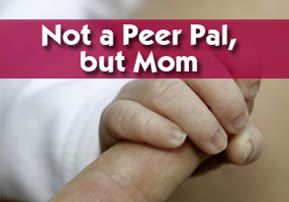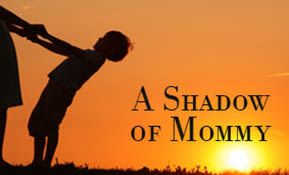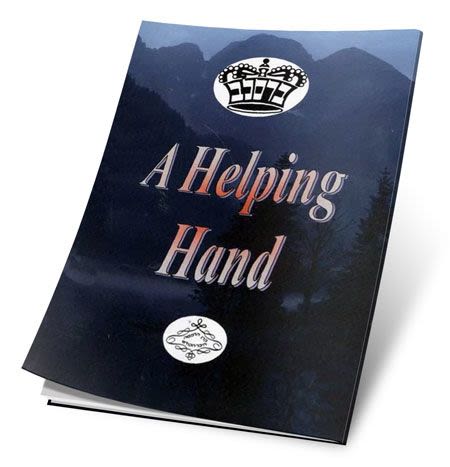
Not a Peer Pal, but Mom
A mother should have a close, warm, loving relationship with her children; but in a mother-child relationship there are boundaries which may not be crossed...

Decisions for a Lifetime, Part 6
One of the most important aspects of chinuch – child education – is the hierarchy and authority in a Jewish home.
One of the principles I established right from the start was that I was my children’s mother and not their friend. Parents think today that they have to be their children’s friend in order to make them happy and succeed in their chinuch, but in reality they are actually undermining that chinuch. On top of that parents feel that they must make their children happy according to THEIR (the children’s) understanding, that that is the yardstick of their success as a parent.
It is true, that if children are unhappy they will grow up as a dissatisfied and suspicious adults, always feeling hard done by, so you should certainly raise your children to be happy and contented adults. But being their friend is not the way to do that.
If you are your children’s “friend” it means you are abdicating the responsibility of being their mother and educating them. One cannot be a “friend”, i.e. on the children’s level, and also a mother, on a level above the children; the two are incompatible.
If you are your children’s friend, you are essentially on the same level as, and competing with all their other friends, and your children will follow whichever friend’s advice is most acceptable to them. You will be the friend “mummy” versus the friends of their own age who of course “understand” better because they are all at the same level of maturity and understanding.
And more than that, if they consider themselves on the same level as you, they will feel it perfectly acceptable to tell you that they disagree with you because you are old-fashioned and don’t understand them. They will also feel free to criticize your point of view, tell you where you’ve gone wrong, what you should be thinking and even more what you should be doing; they will not be ashamed to tell you, because they will genuinely feel that way, that they are right and you are wrong.
By being your children’s friend you’ve totally undermined your authority as a parent to guide and direct them on the right path of life; you have sold your birthright as a mother for a pot of lentils as your children’s friend, all so that they will think you are a “good” mother in their immature eyes. Since when has a child’s understanding been the parameter by which the success of parenting is measured?
This is a terrible catastrophe because it completely breaks up the hierarchy of the Jewish home. The role of a mother is to raise healthy children and educate and train them so that they grow up with the right hashkofohs and values in life. But how can you do that if your children feel that they are as clever, if not cleverer, than you?
Friends are an integral and vital part of our children’s lives and well-being – but it is not the job of parents to play that role.
Parents should have an open, caring line of communication with their children. Children should feel that their parents are there for them and care for them and that they can discuss anything under the sun with them. They should feel that their parents love them and want only the best for them – but they must clearly understand that they, as children, are NOT on their parents’ level.
But how can we get our children to understand the difference between themselves and us? By setting clear boundaries right from the start what children may or may not do – and above all else – by always being consistent within those boundaries. You can and should take into account your children’s wishes when considering something for their good, but only in so far as it does not interfere with what YOU feel is right.
Children must know that they must be honor their parents. The Ten Commandments say kabed ess ovicho ve’ess imecho – honor your father and mother. If you do not teach this to your children and make sure that they honor their parents, you are undermining the core law of the Ten Commandments and thus the Torah itself. Parents have no right to surrender on this point, because parents (not you personally) must be respected.
So what do we mean by respect for parents? The Torah has given us guidelines even on this. It includes not calling parents by their names, not interrupting them when they speak, or talking disrespectfully to them; it means considering their wishes and fulfilling them wherever possible. Any Rov can give you a full explanation of what kibbud ov vo’eim actually entails, and which your husband, if he still has parents, must himself fulfill.
I have friends, who are grandmothers themselves and who still have parents. They talk to them very respectfully and they will not argue or disagree with them but will try their utmost to fulfill their parents’ wishes, even before their own; they talk about their parents with the greatest love and respect.
Bear in mind that good old Jewish saying: “whatever you do, you do for yourself”. If you teach your children to respect their parents (and grandparents), they will teach their children to do the same.
And part of respect for parents is that you, as a parent, can say whatever you choose to your children, but they cannot and may not say whatever they want to you.
One of the ways of drawing clear demarcation lines between parents and children is that you tell the children what you want of them in a loving, caring manner, but you do not “ask for their confirmation”. An example of this would be preparing for dinner; “I’m going to cook xyz for dinner, okay”? (Of course you will bear in mind their likes and dislikes because they won’t eat otherwise), but it’s not okay for them to okay it.
By the so-called method of gaining the children’s co-operation, i.e. making them a willing participant in whatever you want them to do, you are planting the understanding in their minds that they are your equal which in turn will lead to them feeling later that they can voice their difference of opinion if they do not agree with you. Children should be allowed to voice their opinion only when YOU feel it is appropriate, and only within the framework of the parent-child relationship.
Children must be raised with the basic understanding that parents are wiser than they are and understand better what is best for them in all areas and walks of life, and this must be done right from the beginning.
This includes not apologizing when you have done something wrong in the child’s eyes (and even in your own); if you want to you can explain why you have acted in a certain manner but not in such a way that it sounds as if you are justifying yourself.
You should also not always explain to your children why you want them to do something; if you always give them an explanation it “teaches” them that they only need to obey you when they understand the reason for it. By not explaining everything they are learning that they must obey their parents simply because it is part of kibbud horim – and because their parents know best!
There is also another, deeper lesson here which seems to have been forgotten. When children understand that they must respect their parents they learn that there is a higher authority that must be respected. When they are young parents are the only authority figures in their children’s lives but as they mature and their horizons widen this grows to include teachers, mechanchim and Rabbonim. If children have grown up with the understanding that they are, at the very least, the equal of their parents this signals to them that they are the equal of any authority figure.
Why at the end of the day should a child, when he is a teenager and later on an adult, respect the Rabbonim’s authority if he “knows” that he is their “equal” and every bit as “clever” as they are?
We see the result of this breakdown of authority in the outside world, where the prevailing attitude is that quickness of mind and fleetness of foot, i.e. youth, is the best time of life. Anything else, including life-experiences and caution are not worth the paper, i.e. the body, it is imprinted upon.
And we too, by befriending our children, buy into this perception that to be young and strong is the best and most worthwhile time in life.
One can be a mother to one’s children and still have a close, warm, loving relationship; you can, and should be on the best of terms with your children, but in a mother-child relationship there are boundaries which may not be crossed. And children are happier and feel more secure this way; in a “difficult” world (and the outside world is difficult no matter what age you are) children will feel that there is someone stronger and wiser that they can consult with, and when the “going gets tough” that they can turn to and lean on.
To be continued, G-d willing.









Tell us what you think!
Thank you for your comment!
It will be published after approval by the Editor.